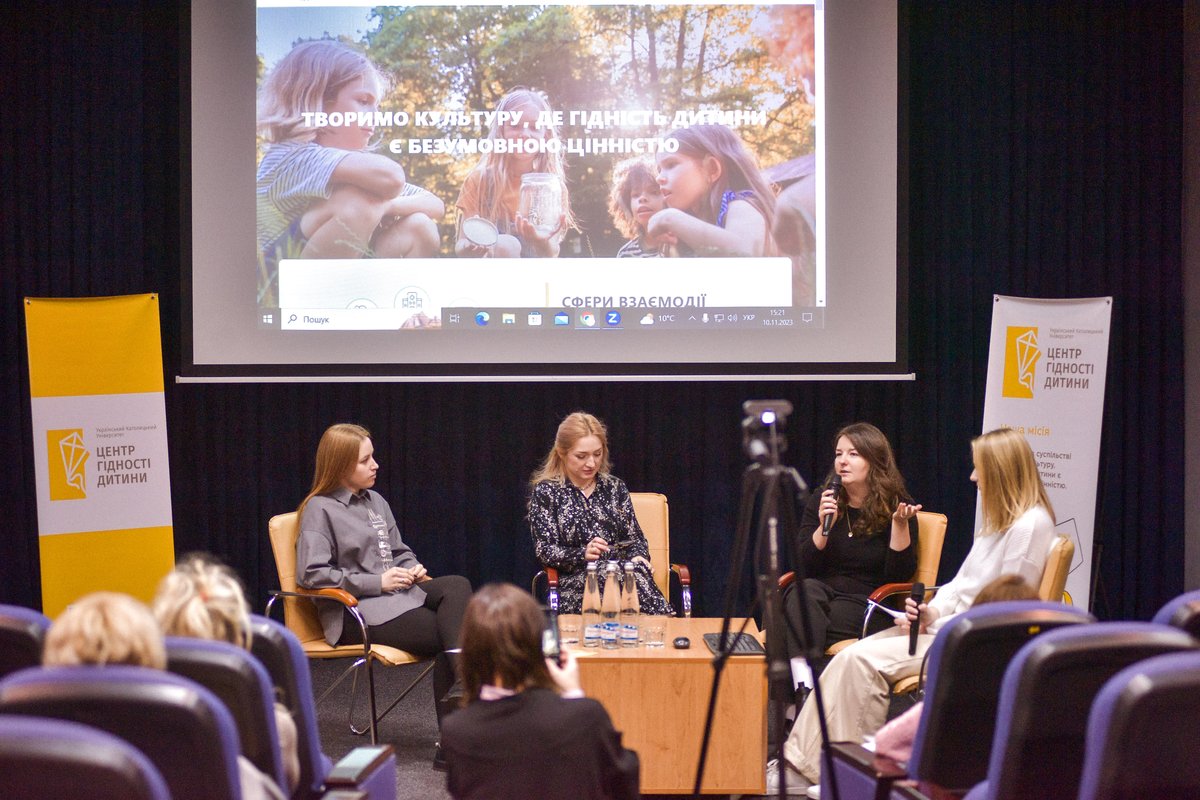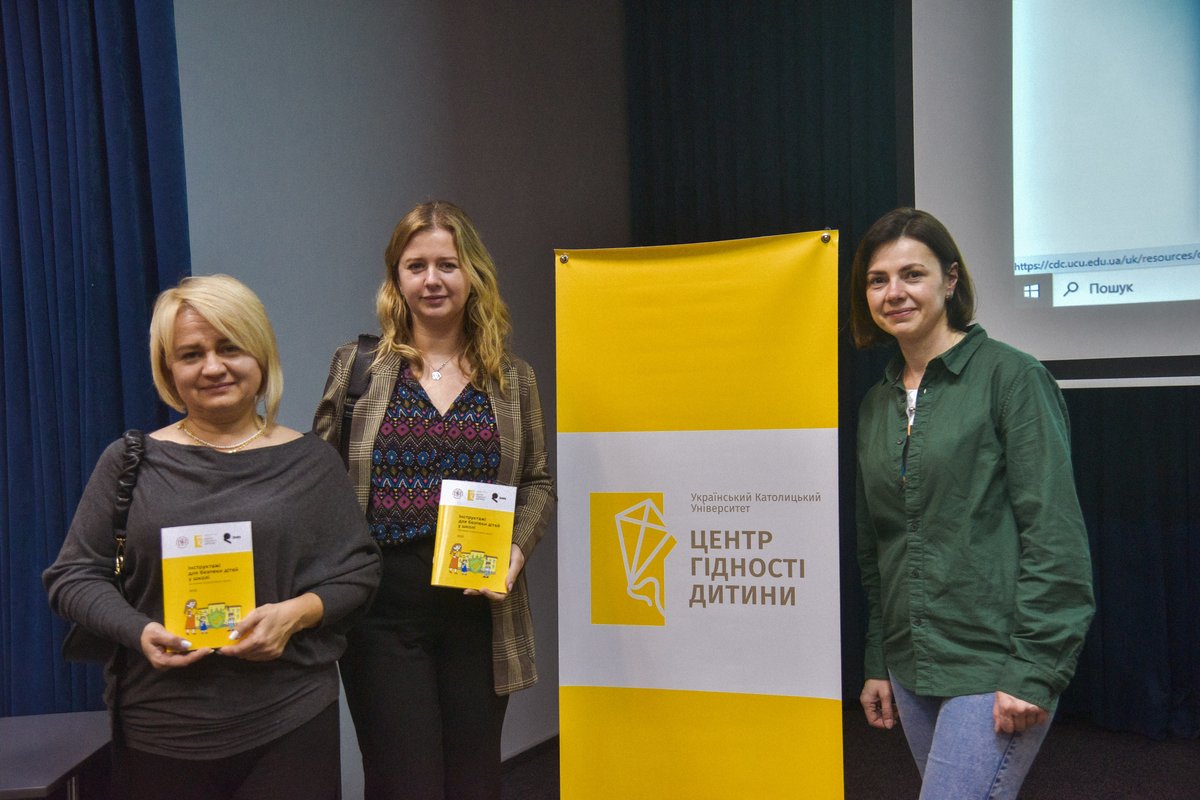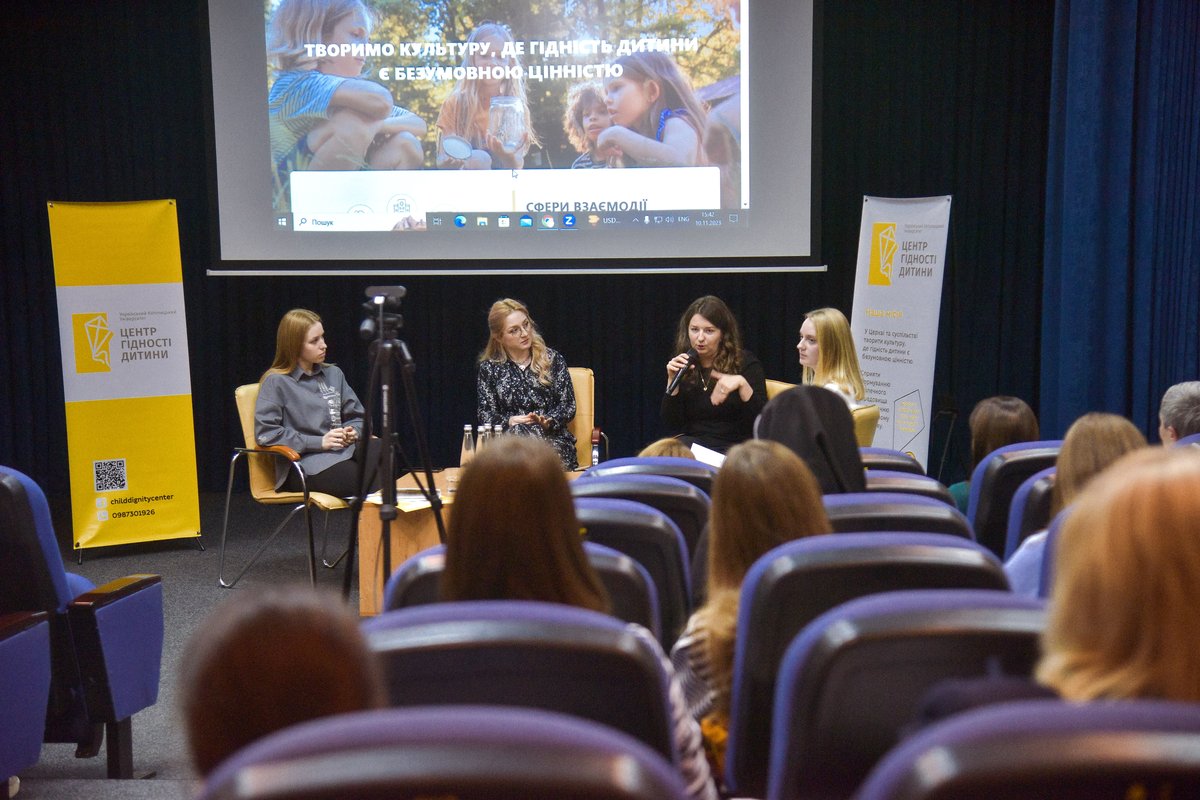"We want our education system to act preventively" - Center for Child Dignity presented instructions for children's safety at school
The UCU Center for Child Dignity developed the manual in cooperation with Ptashenya. Children's Space". It contains lessons during which adults will teach children how to define their own boundaries and defend them in an environmentally friendly way, how to behave when faced with violence, and how to talk about what the child does not like. Who are the trusting adults and when to inform them about certain issues of concern. The proposed classes will be useful for everyone who works with children in educational institutions and beyond.
Christina Shabat, head of UCU's Center for Child Dignity, during the presentation of the "Instructional Manual for Child Safety at School" noted the goal that guided the team: "We have created a manual that contains practical interactive materials that will help adults talk about safety with children, personal boundaries, and teach them how to say no to things they don't like. We want our education system to act proactively, to create conditions where children feel safe." The relevance of the briefings is based on the results of a study by the Center for Child Dignity and the Fama research agency "Sexual Violence in Ukraine" (2021), which showed that:
- 23% of Ukrainians have experienced sexual violence and harassment in childhood, which is almost one in five. A child suffering from sexual abuse can potentially be in every classroom;
- 43% of victims did not tell anyone about what happened;
- 62% of Ukrainians believe that sexual violence is committed by strangers, but in fact, in 85% of cases, children are abused by adult acquaintances.
That is, even a safe place like a home or school does not guarantee true safety without responsible adults who know how to recognize a child's needs, listen and hear them, and treat and protect them with care.
Anastasia Luzhetska, instructional designer, educator, and co-author of the curriculum at Ptashenya. Children's Space, shared her methodological findings: "The value of the classes is that the tasks for children from 4 to 18 years old are explained in clear language for each age. We want to teach children to defend their own boundaries and prevent possible violence against them. After all, with prior knowledge, a child will know how to act in case of a threat. We tried to make the classes interactive and interesting."
The trainings offer lessons that will help psychologists, social workers, kindergarten and school teachers, and anyone who works with minors, to communicate about violence and their own safety in a clear language with different age groups: 4-6, 7-10, 11-14, and 15-18 years old.
The goal of safety briefings is to protect children by providing adults working with them with information, basic rules, principles, and guidelines for protection, and to create an effective system for preventing violence against children.
The project "Implementation of Instruction for Child Safety" is being implemented thanks to the financial support of the ZMINA Foundation, which supports the implementation of methodological practices in the educational and church spheres.
Khrystyna Rutar, program coordinator, and Daryna Shutyak, project manager at the SMIN Foundation, noted: "We strive to support change-making projects. The introduction of the briefings is aimed at minimizing the risks of sexual violence and raising children's awareness of how to take care of their own safety."
The activities included in the collection help children recognize violence and respond to it appropriately. This minimizes the risks of violence and spreads knowledge about sexual violence prevention. Emilia Denysenkova, Chief Specialist of the General Secondary Education Development Sector of the
Education Department of the Lviv City Council, said: "We have a very positive experience of cooperation with the Center for Child Dignity in the joint launch of the course "Safeguarding. Child Safety in the Educational Environment" for schools in the Lviv community on the NIT (Learning and Technology)platform. The "Briefings for Child Safety at School" was included in the supplement to this course. The importance of the manual is that it is not only useful for children to learn about safety. It is also an assistant in the work of teachers, because it is true that sometimes it is not easy to find the right words to explain complex topics like violence."
The dissemination of useful practices of instruction and testing of exercises from the manual directly in work with children is taking place during November in pilot schools and parishes of the UGCC with further research of changes in the church and educational environment.
Viktoriia Seliverstova, director of the Zibolkivka Secondary School of Zhovkva City Council, attended the presentation and shared her thoughts: "I am grateful to the creators of the manual for raising topics that our society tends to keep silent about. I would really like to see training on the prevention of violence against children conducted with psychologists in the ATCs, so that they can train teachers, and they, in turn, can teach children. They could also share useful practices with each other."
UCU's Center for Child Dignity promotes a culture of child dignity and safety and is glad to see the growth of a community of professionals who teach children the rules of personal safety. That is why we work in the educational field, so that the dignity of the child is an unconditional value.
You can download "Briefings for Child Safety at School" for free on the website of the UCU Center for Child Dignity: https://cdc.ucu.edu.ua/uk/resources/posibnik-instruktazhi-dlya-bezpeki-ditej-u-shkoli/
Appendices to the briefings:
https://drive.google.com/drive/folders/1LnYhhq4MhFEzvZRBaeKLGI06qEE21Vzo?fbclid=IwAR0XXR4yw2fTEcqeklxSG5hq1ohcRPa_7iBFQZoUcj2hzCQgcWIrvx-VvJc
Poster "My safety rules": https://drive.google.com/file/d/1gw3kCg2SHmeA3iJYwkVM_9W8bLeucvmz/view?fbclid=IwAR3KytFtgaNVVTEPzZKFz0BHoWsWYhZVw50FwpvWz9sPNhdyyyYEc8dvLp8


